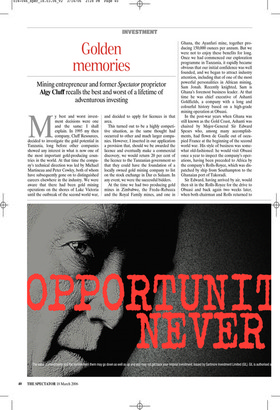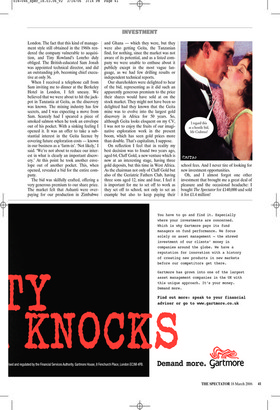Golden memories
Mining entrepreneur and former Spectator proprietor Algy Cluff recalls the best and worst of a lifetime of adventurous investing My best and worst investment decisions were one and the same: I shall explain. In 1995 my then company, Cluff Resources, decided to investigate the gold potential in Tanzania, long before other companies showed any interest in what is now one of the most important gold-producing countries in the world. At that time the company’s technical direction was led by Michael Martineau and Peter Cowley, both of whom have subsequently gone on to distinguished careers elsewhere in the industry. We were aware that there had been gold mining operations on the shores of Lake Victoria until the outbreak of the second world war, and decided to apply for licences in that area.
This turned out to be a highly competitive situation, as the same thought had occurred to other and much larger companies. However, I inserted in our application a provision that, should we be awarded the licence and eventually make a commercial discovery, we would return 20 per cent of the licence to the Tanzanian government so that they could have the foundation of a locally owned gold mining company to list on the stock exchange in Dar es Salaam. In any event, we were the successful bidders.
At the time we had two producing gold mines in Zimbabwe, the Freda–Rebecca and the Royal Family mines, and one in Ghana, the Ayanfuri mine, together producing 150,000 ounces per annum. But we were not to enjoy these benefits for long. Once we had commenced our exploration programme in Tanzania, it rapidly became obvious that our initial confidence was well founded, and we began to attract industry attention, including that of one of the most powerful personalities in African mining, Sam Jonah. Recently knighted, Sam is Ghana’s foremost business leader. At that time he was chief executive of Ashanti Goldfields, a company with a long and colourful history based on a high-grade mining operation at Obuasi.
In the post-war years when Ghana was still known as the Gold Coast, Ashanti was chaired by Major-General Sir Edward Spears who, among many accomplishments, had flown de Gaulle out of occupied France at the beginning of the second world war. His style of business was somewhat old-fashioned: he would visit Obuasi once a year to inspect the company’s operations, having been preceded to Africa by the company’s Rolls-Royce, which was dispatched by ship from Southampton to the Ghanaian port of Takoradi.
Sir Edward, having arrived by air, would then sit in the Rolls-Royce for the drive to Obuasi and back again two weeks later, when both chairman and Rolls returned to London. The fact that this kind of management style still obtained in the 1960s rendered the company vulnerable to acquisition, and Tiny Rowland’s Lonrho duly obliged. The British-educated Sam Jonah was appointed technical director, and did an outstanding job, becoming chief executive at only 36.
When I received a telephone call from Sam inviting me to dinner at the Berkeley Hotel in London, I felt uneasy. We believed that we were about to hit the jackpot in Tanzania at Geita, as the discovery was known. The mining industry has few secrets, and I was expecting a move from Sam. Scarcely had I speared a piece of smoked salmon when he took an envelope out of his pocket. With a sinking feeling I opened it. It was an offer to take a substantial interest in the Geita licence by covering future exploration costs — known in our business as a ‘farm-in’. ‘Not likely,’ I said. ‘We’re not about to reduce our interest in what is clearly an important discovery.’ At this point he took another envelope out of another pocket. This, when opened, revealed a bid for the entire company.
The bid was skilfully crafted, offering a very generous premium to our share price. The market felt that Ashanti were overpaying for our production in Zimbabwe and Ghana — which they were, but they were also getting Geita, the Tanzanian find, for nothing, since the market was not aware of its potential, and as a listed company we were unable to enthuse about it publicly except in the most vague language, as we had few drilling results or independent technical reports.
Our shareholders were delighted to hear of the bid, representing as it did such an apparently generous premium to the price their shares would have sold at on the stock market. They might not have been so delighted had they known that the Geita mine was to evolve into the largest gold discovery in Africa for 50 years. So, although Geita looks eloquent on my CV, I was not to enjoy the fruits of our imaginative exploration work in the present boom, which has seen gold prices more than double. That’s capitalism, I suppose.
On reflection I feel that in reality my best decision was to found two years ago, aged 64, Cluff Gold, a new venture which is now at an interesting stage, having three gold deposits, but this time in West Africa. As the chairman not only of Cluff Gold but also of the Geriatric Fathers Club, having three sons aged 12, nine and four, I feel it is important for me to set off to work as they set off to school, not only to set an example but also to keep paying their school fees. And I never tire of looking for new investment opportunities.
Oh, and I almost forgot one other investment that brought me a great deal of pleasure and the occasional headache: I bought The Spectator for £140,000 and sold it for £1.4 million!



















































































 Previous page
Previous page